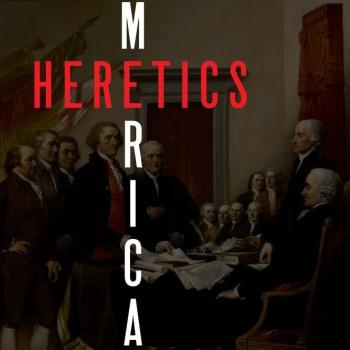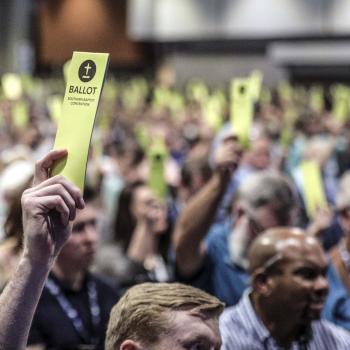Even some seventy years after the Second World War, when one is in Germany one receives reminders of the Holocaust. Here in Heidelberg, vacant space and an understated memorial mark the 1938 destruction of the Jewish synagogue. That permanent emptiness reminds one of the enduring cost of evil. Most Heidelberg Jews died in Auschwitz. A new synagogue was built in Heidelberg in the 1990s.
Most westerners know of and acknowledge the basic facts of the Holocaust, but fewer know about the periodic exterminations and expulsions of Jewish populations in Europe over the course of centuries. For various specious reasons, Christians butchered their Jewish neighbors. On St. Valentine’s Day in 1349, two thousand Jews in Strasburg, France were arrested and placed on a wooden platform in their cemetery. Around a thousand accepted baptism and were spared. Some children were forcibly taken from their parents, baptized, and spared. The rest – perhaps close to a thousand – were burned. They died because they were accused of spreading the plague.
In Speyer, Germany, tourists frequently visit a Jewish mikwah (ritual bath) which dates back to the early twelfth century. Anti-Semitism grew over the following few centuries. Then, according to a pamphlet from the historical site: “Around the year 1500, the history of the medieval Jewish community of Speyer came to an end; the reasons for the decline and extinction of the community are not fully understood.
Elsewhere things are more clear. Americans (and others) flock to the walled medieval town of Rothenburg, where (at least in many of the shops) it is perpetually Christmastime. Jews had lived in Rothenburg — a trading center — for some time until the entire community was exterminated in 1298 during a region-wide pogrom. Perhaps 450 individuals were killed. More Jews built up a new community, only to have it destroyed fifty years later. Again, new Jewish settlers moved into Rothenburg. Then, in 1520, the city passed an ordinance forbidding their further presence. Jews finally returned in 1870, only to all be deported or driven out sometime before 1938. To the best of my knowledge, there are no Jewish residents of Rothenburg today. It is a history at odds with the town’s charm and the surrounding area’s pastoral beauty.
None of this has any direct connection to the growing strength of the boycott, divestment, and sanctions movement (BDS movement), designed to end the Israeli occupation of Palestinian territories through economic and cultural isolation. I have no space here to write anything of sufficient length or reflection about the Israeli-Palestinian conflict itself. From my vantage point, Israel has very legitimate concerns about its security, and Palestinians unjustly lost their land and homes in the years leading up to and following the creation of the State of Israel.
Still, I feel very uncomfortable with the efforts of American institutions to support the BDS movement. In mid-December, the American Studies Association voted to boycott Israeli universities based on the following reasoning: “Israel’s violation of international law and UN resolutions; the documented impact of the Israeli occupation on Palestinian scholars and students; [and] the extent to which Israeli institutions of higher education are a party to state policies that violate human rights.”
More recently, my own Presbyterian Church in the United States of America (PCUSA) issued a pamphlet that, among other things, critiques Zionism as a false theology. Furthermore, at its upcoming General Assembly the denomination will consider a proposal to divest itself of holdings in three companies because they profit from the Israel occupation of Palestinian land. This has been a live issue within the denomination for decades. A similar measure failed narrowly two years ago.
This is a tricky issue for denominations that weigh in on political issues. One could argue quite reasonably that no one listens to Presbyterians, but Presbyterian resolutions and statements on this issue have consistently gained attention. The mere fact that Jews have suffered repeatedly at the hands of Christians does not mean that Christians can never criticize Israeli policies. That would violate the need for Christians to embrace truth and justice.
It is also (partly) unfair to argue that Presbyterians focus on Israel while ignoring other injustices around the world. The denomination has divested itself from holdings in tobacco and gambling companies and divested itself from one company with ties to the Sudanese government. I think very few American Presbyterians abhor Israel or condemn Israel while blindly ignoring other injustices in the region or world.
At the same time, no one pays much attention to what Presbyterian say about almost anything else (same-sex relationships are one exception to this rule). Therefore, by condemning Zionism and implicitly lending support to the broader BDS movement, American Presbyterians — fairly or unfairly — allow themselves to be characterized as hostile to Israel’s very existence. Given the history of Christian anti-Semitism, Presbyterians should feel far more angst about taking such steps. The extent of historical Christian anti-Semitism means that Christians must tread extremely carefully and give no quarter to the rampant anti-Semitism in the Middle East or the too fashionable anti-Semitism in certain segments of European society.












